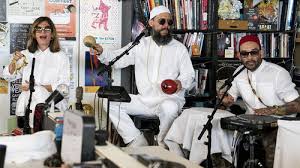 SOUNDTRACK: ÌFÉ-Tiny Desk Concert #736 (April 29, 2018).
SOUNDTRACK: ÌFÉ-Tiny Desk Concert #736 (April 29, 2018).
 ÌFÉ is from Puerto Rico. Creator Otura Mun has a fascinating history as to how he wound up creating this band:
ÌFÉ is from Puerto Rico. Creator Otura Mun has a fascinating history as to how he wound up creating this band:
Otura Mun started out in the world as Mark Underwood, a Goshen, Ind., native whose parents were Mennonites and who managed to snag a coveted spot on the University of North Texas’ drumline. But that was before a flight mixup landed the percussionist, composer, DJ and producer with a free trip to Puerto Rico. Two years later, he moved permanently to the island, became a Yoruban high priest and began creating electronic music that channeled the African diaspora.
Woah.
So ÌFÉ (pronounced ee-faye) combines traditional Afro-Cuban drumming and chanting with a kind of Jamaican dancehall sound. Midway through the set, Mun explains that he drilled holes into the traditional acoustic drums and has attached electronics to them, essentially making them triggers, but with the traditional acoustic sound as an overtone. It’s pretty amazing.
The group’s debut album, IIII+IIII, (pronounced “Edgy-Og-Beh”) is a fresh electronic take on tradition that’s winning over even the most devout practitioners of the western African-based spiritual ceremonies that form the base of their music. That’s hard to do with ritual music.
Although interestingly, for the first song “House of Love (Ogbe Yekun),” they play acoustically.
For their turn behind the Tiny Desk, Otura Mun and his ensemble unplug their drums for their first tune, an acoustic version of their “House of Love (Ogbe Yekun)”.
This acoustic sound is quite compelling in itself. Yaimir Cabám plays a beautiful acoustic guitar (pretty, simple chords) and sings, I believe wordlessly. Meanwhile, the rest of the band plays various percussion: simple electronic percussion and shaker and various hand drums. Anthony Sierra on congas keeps the rhythm.
After a verse, Otura Mun joins in on vocals (with deep backing vocals from Beho Torrens). It’s a quiet, soothing song with occasional punctuation from the drums. When the melody finally changes after 4 minutes, it sounds like a massive shift even if it’s just a few notes.
“Prayer for Oduduwa (Para Meceditas)” opens with bells and shakers and some interesting electronic splashes before the massive amounts of electronics take over the song. I believe Rafael Maya joins them and was not their for song one.
The sound of the second song here is what startled me when I heard the band’s debut CD last year: the parts normally performed on Afro-Cuban bata drums and chekeres are electronically treated for a traditional prayer for the deity Oduduwa.
They sing in a traditional chanting style including an awesome low chant (from Torrens) that sounds otherworldly.
By the last tune, “Bangah (Pico Y Palo),” the electronics have created a sonic playground that plays perfectly against the battery of Afro-Cuban rhythms. “Bangah,” focuses on a reflection of the Orisha Ogún, the owner of war in the religion, whose main tool is the machete.
Mun says he wanted to play urban music you could improvise and to use percussion as the basis–Cuban rumba combined with Jamaican dancehall. He demonstrates some sounds and then a deep rumbling bass: “we got your nasty subs that you know from that the stuff that’s nasty.”
The song is a shout out to those struggling against the vestiges of colonialism still prevalent in Puerto Rico.
They begin the song with a “breathe in” [inhale] let it out Ahhh!
I love the way the various voices are processed. Torrens sound deeper and Cabám’s voice sounds alien and like it is three voices at once. The various lines are interspersed with interesting vocals sounds: grunts and screams that punctuate the verses.
It’s a very cool set.
[READ: March 19, 2018] The Rat with the Human Face
In 2014, Angelberger’s first book The Qwikpick Adventure Society was reissued as Poop Fountain. He then wrote two more books in this trilogy.
This is the second book (written in 2015) and it opens with this
This is the second of three stacks of papers this guy found in a storage room at the old Qwikpick gas station in Crickenburg. The guy, who asked me not to use his name, called me because one of my old newspaper articles was in the first stack. (You know I was a reporter before I wrote the Origami Yoda books, right?)
Then he reminds the readers that this book is set in 2000–kids didn’t have iPhones or smartphones. They didn’t have phones at all and cameras took forever to charge the flash and they drained the batteries fast.
So the entire Qwikpick Adventure Society: Lyle, Marilla and Dave is back, but this story begins with bad tidings–the Qwikpick Adventure Society was disbanded after this adventure. (more…)
